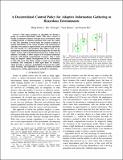A decentralized control policy for adaptive information gathering in hazardous environments
Author(s)
Dames, Philip; Schwager, Mac; Kumar, Vijay; Rus, Daniela L.
DownloadRus_A decentralized.pdf (380.4Kb)
OPEN_ACCESS_POLICY
Open Access Policy
Creative Commons Attribution-Noncommercial-Share Alike
Terms of use
Metadata
Show full item recordAbstract
This paper proposes an algorithm for driving a group of resource-constrained robots with noisy sensors to localize an unknown number of targets in an environment, while avoiding hazards at unknown positions that cause the robots to fail. The algorithm is based upon the analytic gradient of mutual information of the target locations and measurements and offers two primary improvements over previous algorithms [6], [13]. Firstly, it is decentralized. This follows from an approximation to mutual information based upon the fact that the robots' sensors and environmental hazards have a finite area of influence. Secondly, it allows targets to be localized arbitrarily precisely with limited computational resources. This is done using an adaptive cellular decomposition of the environment, so that only areas that likely contain a target are given finer resolution. The estimation is built upon finite set statistics, which provides a rigorous, probabilistic framework for multi-target tracking. The algorithm is shown to perform favorably compared to existing approximation methods in simulation.
Date issued
2012-12Department
Massachusetts Institute of Technology. Computer Science and Artificial Intelligence Laboratory; Massachusetts Institute of Technology. School of EngineeringJournal
Proceedings of the 2012 51st IEEE Conference on Decision and Control (CDC)
Citation
Dames, Philip, Mac Schwager, Vijay Kumar, and Daniela Rus. “A Decentralized Control Policy for Adaptive Information Gathering in Hazardous Environments.” 2012 IEEE 51st IEEE Conference on Decision and Control (CDC) (December 2012).
Version: Author's final manuscript
ISBN
978-1-4673-2066-5
978-1-4673-2065-8
978-1-4673-2063-4
978-1-4673-2064-1
ISSN
0743-1546